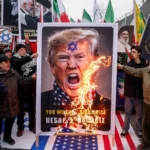
The day after the Iranian attack with hundreds of missiles and drones against Israel – none of which caused significant damage or fatalities – the main question was whether the Government of Benjamin Netanyahu will respond, attacking Iran in turn and ignoring international calls to “containment”, the word most repeated by world leaders and organizations in the hours after the attack.
Israel’s Foreign Ministry was the first to offer a response, stating that “Iran must pay a price for its aggression” against the Jewish state, although the Ministry made no reference to an Israeli military retaliation. According to a statementthat “initial price” must be the designation of the Iranian Revolutionary Guard – in charge of carrying out and announcing the attack – as a terrorist organization.
Tel Aviv has also celebrated that “the world stands with Israel and supports its right to defend itself,” after the “strong condemnations of the brutal Iranian attack that have been heard from around the world.” Indeed, condemnations of Iran’s actions have come from practically all countries and world leaders, much more numerous and forceful than those that followed the April 1 attack against the Iranian consulate in Damascus, a bombing attributed to Israel and in the that seven members of the Revolutionary Guard died – including a high command of this powerful body that is part of the Iranian Army and has a lot of influence inside and outside the country.
Tehran claimed that its attack this weekend is in response to the latest and deadliest bombardment against its ‘guardians’ in Syria. April 1 was not the first time Israel targeted the Revolutionary Guard, which operates on Syrian soil to support President Bashar Al Assad’s regime. Other Iranian troops had been killed in recent months, since the beginning of the war in Gaza and the subsequent increase in tensions in the area, but the bombing of the diplomatic legation was a direct affront to the Government of Iran.
US tries to limit Netanyahu’s response
From Washington, the reaction to the Iranian attack has been more lukewarm than one would expect, because the White House seeks by all means to avoid the conflagration of a large-scale conflict, into which it would inevitably be dragged, informa Antonia Crespí. The spokesman for the US National Security Council, John Kirby, declared this Sunday that President Joe Biden seeks to avoid a broad war in the Middle East and does not want the US to become involved in the conflict between Iran and Israel. However, in an interview with ABC television, Kirby noted that any response to the Iranian attack depends on the Army and the sovereign State of Israel.
This Sunday the Israeli war cabinet, made up of Netanyahu, the Minister of Defense and three other senior officials, met to study this possible response but the meeting ended without a decision, after several hours. According to anonymous Israeli sources, cited by the Reuters news agency, there are differences within the cabinet regarding the timing and magnitude of this response.
Meanwhile, a White House source anonymously told the press that the US will not join any retaliatory action that Israel takes against Iran. According to that source, Washington believes that Israel “has the freedom to defend itself,” but US policy is not to participate in such military actions. “We couldn’t imagine participating in something like this,” she said, according to Agencia EFE.
Another White House source told Reuters that President Biden himself told Netanyahu that he would not participate in a possible retaliation against Tehran – which, in turn, has threatened to respond by attacking the US. His Foreign Minister, Hosein Amir Abdolahian, once again warned the US this Sunday not to use the military bases it has in countries close to Iran to “defend and support the Tel Aviv regime”, because that would “inevitably” entail a Iranian attack against those positions. The US has two large military bases in the Persian Gulf, in Bahrain and Qatar, as well as a military presence in Iraq, where tensions with Iran have already led to attacks on US troops in the past.
In 2020, Iran launched several ballistic missiles against two Iraqi bases where there were US troops, after a targeted attack carried out by a US drone in the Iraqi capital killed Iranian general Qasem Soleimani. The deceased was the commander of the elite Quds Force brigade, belonging to the Revolutionary Guard, and supervised Iranian operations abroad, especially in Iraq and Syria, those forces where they played a fundamental role in the fight against the Islamic State terrorists. between 2014 and 2019.
The assassination of Soleimani significantly raised tension in the Middle East in early 2020, especially between Iran and the United States, and the allies of each power in the region, but it did not lead to an open conflict. In this case, Israel’s involvement adds tension and risk to a very delicate and explosive situation; and it does not help at all that the Israeli Government is the most extremist in the brief history of this country and has some far-right and Zionist ministers who would like to eliminate Iran and the Arabs from the map of the Middle East.
The Arab world remembers that the origin of violence is Gaza
Taking into account what happened in 2020, when Iraq became the battlefield between Tehran and Washington, Iraqi President Abdelatif Rashid pointed out this Sunday “the need to reduce tensions and not allow ourselves to be dragged into widening the circle of conflict.” in the Middle East, where Baghdad tries to maintain a difficult balance between its Shiite political and commercial partner, Iran, and other neighboring or allied Arab countries.
For its part, Lebanon, the most affected so far by the Gaza war – the Shiite group Hezbollah operates in its territory, which has been exchanging fire daily with the Israeli Army on the border between the two countries since October – called for a emergency meeting of the Council of Ministers for this Monday, in “these critical moments” for the small country, where any spark can set off a major conflict. Beirut has been fearing for months that Hezbollah’s confrontation with Israel will end up leading the entire country into a war, like the one in 2006, in which Israeli fighter bombers destroyed entire neighborhoods of the Lebanese capital and killed numerous civilians.
All the Arab governments most directly involved called for “maximum containment” after the Iranian attack, although they did not hold Tehran responsible for the increase in regional tension, not even those that do not maintain good relations with the Shiite regime (for example, Saudi Arabia and United Arab Emirates). From Cairo, the Government affirmed that “the dangerous escalation that the Middle East is currently experiencing” is a direct result of what Egypt has repeatedly warned, that is, of the Israeli offensive in Gaza and other “provocative military actions” by from Tel Aviv. Egypt was the first country to seal a peace agreement with Israel, in 1979, followed by Jordan in 1994.
Jordan, which also plays a relevant role in the Palestinian-Israeli conflict, intervened on the night of Saturday to Sunday in favor of the Jewish State and shot down some of the drones that were flying over its territory heading to Israel. King Abdullah II spoke with President Biden this Sunday and assured him that Jordan will not be the “scene of a regional war.” According to a statement from the Jordanian court, Abdullah said that “immediately ending the war in Gaza is the way to stop the escalation and protect the region from its consequences.”
He has not been the only one who has recalled that the origin of the escalation is the massacre that Israel is committing in the Strip, where the deaths exceed 33,700, including more than 14,500 children, since last October 7. The Israeli offensive against the Islamist group Hamas in Gaza has strained relations with the so-called ‘Axis of Resistance’, headed by Iran and which includes armed movements at odds with Israel and that champion the Palestinian cause, such as Hezbollah or the Houthi rebels. of Yemen, in addition to Hamas itself.
“We have already seen the regional effects in Lebanon, Yemen, Iraq, Syria and Egypt. The risk of a broader regional conflict increases every day that the siege on Gaza and the war against its civilian population is allowed to continue,” Timothy Kaldas, deputy director of the Tahrir Institute for Middle East Policy (TIMEP), told elDiario.es. for its acronym in English, based in Washington). “The best way to ensure that we avoid a war in the region is through a lasting ceasefire,” adds the expert, who believes that a broader war has been avoided, at least for the moment.
“Any responsible government committed to de-escalation and regional stability must do everything it can to pressure Israel to end its war in Gaza,” says Kaldas, who is also a professor at the Autonomous University of Barcelona (UAB). . Among the pressure measures, the expert mentions the immediate interruption of arms shipments – mainly by the US, which supplies the bulk of the defense material that Israel imports – and the suspension of the association agreement between the European Union and Israel – a measure that Spain has already requested.
Kaldas directly attacks the US for its unconditional support for Israel in the Gaza war for more than six months. He claims that Iran’s attack reminds us that “the reckless decision of Washington and others who support Israel,” who have allowed the war in Gaza to drag on “without real pressure to end hostilities, has significantly increased.” the risk of a broader regional conflict.” A risk that is now greater than ever after Iran’s first direct attack on Israel in decades of enmity and mutual hatred that the Gaza massacre has exacerbated.
Source: www.eldiario.es

